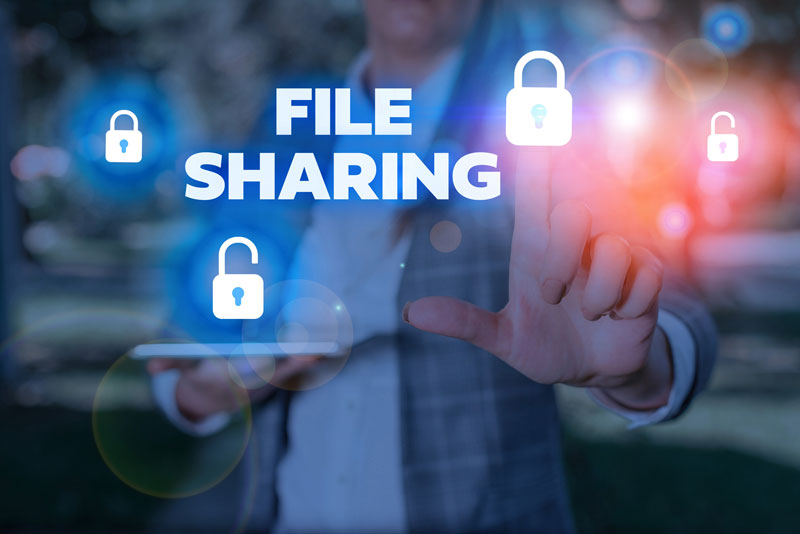As every business is built on teamwork, the ability to share files, collaborate and communicate smoothly is crucial for all the processes in the workplace. Data sharing is particularly relevant for organizations outsourcing medical data entry, financial data conversion, and data entry for health information and other personally identifiable information. Earlier, sharing files and collaborating was often a time consuming task. However, with the latest technological advancements in place, file sharing in organizations is no longer a matter of concern. Today, all you need is a few clicks to get things done in a right and secured manner. In fact, technologies like cloud storage and virtual desktop infrastructure (VDI) have completely changed how files are shared in the workplace. Secure sharing of information or data is crucial for organizations as they have to deal with diverse confidential data. However, file sharing has its downsides as it can get easily lost in multiple document versions, potentially putting sensitive data at risk. Data security is a major concern as during each movement from one repository to another, data confidentiality could be compromised. Sharing and converting paper-based data into digital format with the help of a data conversion company can help you understand, analyze and present information effectively. In fact, digitized data provides accessibility, data visibility and a high level of data security.
Sharing files securely is crucial for businesses that want to ensure confidentiality of data. In simple terms, secure file sharing refers to the act of sending documents digitally in a manner that protects the shared information from being accessed by unauthorized users. Such data can be shared only with selected individuals or groups that have a legitimate reason to access this sensitive information. The secured file sharing option is typically accomplished through a combination of security protocols that encrypt the data and require individuals to enter passwords or other information before accessing the files.
Why Secured File Sharing is Crucial for Businesses?
Over the past few years, a growing work trend has emerged wherein people have shifted the expectations of what a workplace should be. Even before COVID-19 pandemic, an estimated 43 percent of American employees worked remotely on a regular basis. Due to the enforced work from home pattern caused by the pandemic, the remote workplace has become an essential aspect for businesses to continue their effective working pattern. In many cases, this has enhanced the viability of remote working patterns and its universal implementation, thereby shifting perceptions of what it means to operate in a modern workplace. Video conferencing and file sharing mean that real-time discussions can be held regardless of who is physically present in the office, reducing costs for the business and giving staff more freedom to mold their work. However, even these rapid changes can often result in new or increased security risks. For instance, there is a much greater chance of files being accessed on unsecured personal devices or devices being lost or stolen. Both these could result in a data breach, damaging a company’s relationships with customers and partners.
There are plenty of secure file sharing systems with varying features, security protocols, price points, and ideal use cases. These include – Emails, USB storage, Virtual data rooms (VDRs), Basic cloud storage/sharing solutions, File transfer protocol (FTP) and other document collaboration tools. While email attachments and USB storage have been the norm for many years, the digital transformation of workplaces has highlighted the basic flaws of these known file sharing methods. Cloud-based services and project management platform tools help to address these challenges and help improve security and productivity. Some common benefits of these file sharing platforms include –
- Secure file transfer
- Cloud access to the latest versions of documents
- Smooth collaboration – allowing multiple users to access information quickly, and avoid any unnecessary delays
- Easy management of projects
- No hassle during auditing
- Reduce administrative costs
How to Keep File-Sharing Secure – Tips for Businesses
Regardless of the many benefits of file sharing for business, sharing valuable data and files online always involves their share of risks. This is the prime reason why file-sharing tools are not used in isolation and get integrated into an existing holistic security strategy. Here discussed are some useful tips for selecting the right secure file sharing solution for sharing sensitive files responsibly –
- Determine the Business Needs – When it comes to file sharing, each business may have different needs. Sharing confidential documents, for instance during Mergers and Acquisitions (M&A) due diligence process requires a much more robust and secure file sharing platform than when sharing employee headshots for the company website. Once you have determined exactly what kind of documents you need to share and how critical it is that the information remains confidential, you can start comparing solutions that match your unique needs.
- Free Cloud Storage Solutions – Free cloud storage solutions are the most common tools used by businesses around the world. However, they are not the right fit for every situation. These specific files shared could cause a major harm to your company if they fall into the wrong hands. Make sure to pay for a service that offers the enhanced security features that businesses require and offers the assurance that your data remains protected in the long run.
- Limit Access Permissions – A simple, but often overlooked process is to regularly access and update access permission for files and folders. For instance, if someone has a legitimate need to review three important company files, only send them required copies of files. Providing access to all of your information to a trusted source may be a common practice, but this may only increase the chances of data leak. Provide users access to only those specific files they need to do their jobs. This can be split by department, seniority, or individually. By restricting data access, the chances of files being accessed illegally can be reduced by having fewer accounts able to view them. Limiting access permissions should not be a single-time task. Rather, it should become a habit as part of seasonal security processes. Staff turnover and changes in campaign plans are just two of the reasons why permissions may need revising or revoking.
- Password Management – Strong passwords are essential for effective security. Be sure to set a complex password that meets the standard recommendations for password length and character type. This will help ensure that even if someone gets access to your shared file, they won’t be able to easily guess the password. However, a sheer increase in the number of passwords that need to be remembered can lead to users opting for convenience over security and using simplified passwords, or repeating them across accounts. This can easily be avoided by providing a password manager tool. These tools will help remember all of a user’s passwords – meaning they only have to remember one for the manager tool. With a business account, it is also possible to set permissions for shared passwords. In fact, many password managers will automatically generate new, secure passwords making it easier for users to remain secure on any device.
- 2-FA/MFA – A useful tool for ensuring that access to data remains protected, 2-factor authentication (2-FA) involves users verifying their individual identity by another means beyond a simple password. For instance, in order to log in to a shared network, users will need to provide a unique code alongside a username and password. This code could be sent to a separate mobile device or email account meaning that even if the password gets hacked by cybercriminals, the access to the network will not be gained. Multi-factor authentication (MFA), on the other hand, follows the same principle as 2-FA but involves additional authorization steps. This could be in the form of a pin number or a biometric identifier, such as fingerprint or facial recognition.
- Use a VPN – A prominent security measure for protecting business data, a virtual private network (VPN) is essential for protecting files from being intercepted when accessed on public or unsecured networks. A VPN operates like a tunnel by encrypting and concealing the data being transferred. This means that third parties are not likely to intercept data and even if they do, it would be encrypted and unusable. Setting up an office VPN for users working remotely will ensure that all the files can be securely shared between virtual office spaces. This can in fact, be used in addition to any end-to-end encryption offered by the file-sharing services, adding another layer of security to the shared files.
- Run Regular File Audits – Regular monitoring of files is equally important as monitoring the people who have access to files. Files that are outdated or unused should be removed as this could save bandwidth. In addition, it also ensures that the only files that are available to share are those that are actively required by staff to do their jobs.
- Minimize Human Errors – Even though there are many ways to protect files using security software, human errors remain the most common cause of a data breach. The majority of human errors are likely due to a lack of awareness or training around best practices, particularly true in case of unfamiliar software. Providing sufficient training to the staff, right from making copies of files and changing access permissions to sharing passwords across accounts is crucial in ensuring security of shared business files.
Establishing all secure measures to ensure data protection is important for a business to operate holistically. With new and evolving international privacy and security regulations in place, organizations must take all necessary measures to ensure data protection. Even though cloud file sharing is the most effective solution for collaborative working, it is important to check whether the working and data sharing pattern matches the day-to-day security requirements of your business. By analyzing the basics and taking advantage of the right solutions, you can protect your business by reducing the risk of sensitive data falling into the wrong hands. Relying on the services of a reputable business process outsourcing company can help ensure protection of sensitive business data and prevent leakage of information. A professional outsourcing company with data security built into their processes, IT infrastructure and network is critical to prevent security breaches and data misuse.




